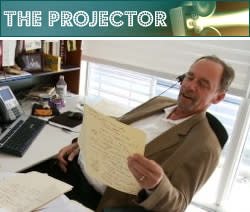Review: ‘Page One: A Year Inside the New York Times’

It's hard to know what non-media junkies will make of "Page One: A Year Inside the New York Times," a documentary that chronicles a year at the venerable paper as it faces online challenges from the likes of WikiLeaks, Twitter and Craigslist. But for me, I found it absolutely fascinating and downright inspiring. It's one of those movies that's so in my wheelhouse that I almost question my own enthusiastic response to the material. I wish the filmmakers had done the same.
Directed by Andrew Rossi, "Page One" covers a roughly 14-month period between 2009 and 2010 inside the offices of The New York Times, specifically the Media Desk. Rossi's cameras follow editors like Bruce Headlam as they do their jobs, and the filmmakers were fortunate to have picked a period that turned out to be rather important in shaping the paper's future. Two WikiLeaks' exposes, the coverage of the Tribune Company's bankruptcy, the rise of the iPad, the Times' decision to set up a paywall to combat lowered ad revenues: The New York Times wasn't just reporting the world but also documenting the rapid changes within journalism itself.
Beyond the fly-on-the-wall observations about how The New York Times operates, "Page One" is also a portrait of David Carr, the outspoken former drug addict who is one of the Times' most visible media columnists. (Film fans probably know him best as the former writer of The Carpetbagger, the paper's Oscar blog.) Early on in the filmmaking process, Rossi figured out that Carr would make for a dynamic, heroic figure, a journalist with an engagingly rough-and-tumble personality who could be the face of his documentary. It was a wise decision, less because of Carr's triumph-over-adversity personal story than it was for his ability to embody the best qualities of his profession: passion, intelligence, straightforwardness, an impatience with incompetence or deception. For years, Hollywood has made fictional newsmen that have tried to capture the same spirit that Carr exudes as easily as he smokes his cigarettes.
But "Page One" isn't just about personalities. Rossi, who claims that the newspaper had no control over the film he made, has turned his documentary into a manifesto about the importance of old-fashioned journalism at a time when blogs and other online services are threatening traditional newspapers' primacy. This doesn't mean Rossi ignores criticism about the Times -- the Jayson Blair and Judith Miller scandals are dutifully mentioned -- but the documentary's main thesis, which I don't disagree with, is that the world (and our democracy) would be greatly impacted if The New York Times ceased to exist. The film makes that argument compellingly, but "Page One" can't help but feel more like a rah-rah editorial than a dispassionate, vetted news story, without offering much in the way of a counterargument. (Even the Blair and Miller stories are there to remind us that, yes, The New York Times has made mistakes before, but everything's better now.)
Rossi does better in showing how new media has changed the business of news-gathering. Nick Denton, founder of Gawker, is given decent talking-head time, and Carr's embrace of Twitter demonstrates how journalism old and new can work together. This is where "Page One" is most stimulating, offering a conversation about where journalism will go in the future and how we'll perhaps have to revaluate the ways in which we define "news" in the 21st century. "Page One" most of the time feels like a debate in which the outcome is not yet determined, the ideas bouncing around the screen and engaging the audience.
It's the times when that doesn't happen where "Page One" is less provocative. Documentaries as different as "The War Room" and "Control Room" have engagingly provided access to little-seen corners of our world, but one of the problems with "Page One" is that there are instances when the sitting-around reality of life in a newsroom isn't particularly riveting or cinematic. Plus, other than Carr, the film's supporting cast never quite emerges as interesting personalities. What we do discover, however, is just how driven and smart these people are, which is intoxicating. (It's a wonder Aaron Sorkin has taken so long to set one of his walk-and-talk dramas in a newsroom, although his new HBO series deals in cable news, not print journalism.) You can quibble about the clear-cut pro-Times position of the film -- and that fact that you don't see how, say, the sports or entertainment sections work -- but Rossi's passion for his subjects' passion is undeniable. It might have been nice if "Page One" had done more to acknowledge that other newspapers do great work, too, but his ability to make journalism not just important, but vital, is a trick the newspaper industry itself has yet to master.
Grade: B+

